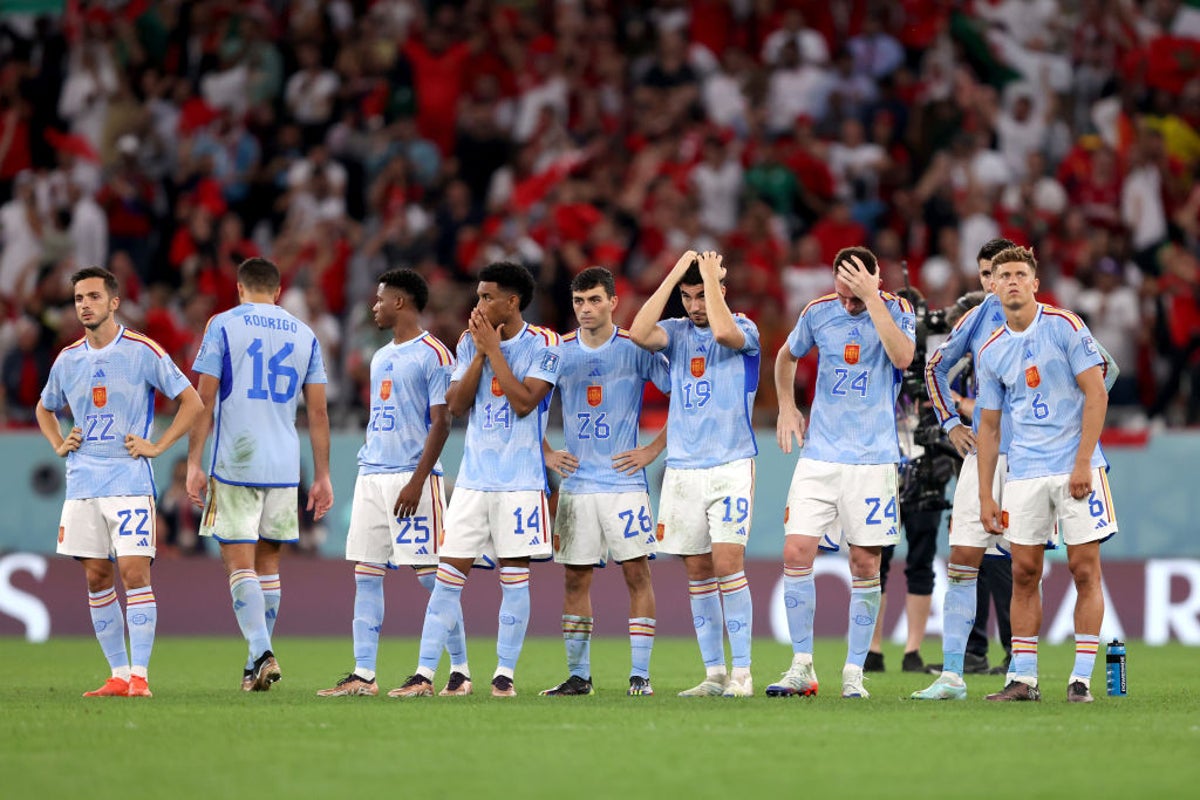
"I couldn't care less about the result,” Luis Enrique had said in the build-up to Spain’s latest bid to get past the World Cup’s first knockout round. He will care about this one, a magnificent Morocco instead earning the best in their history and a first-ever quarter-final place with it.
It came in a penalty shootout, just as it did against Russia four years ago at the same stage, Enrique’s homework assignment to “take 1,000 penalties” before this tournament a year ago evidently not undertaken.
Pablo Sarabia, Carlos Soler and Sergio Busquets all erred from 12 yards this time before Achraf Hakimi impudently showed them how it was supposed to be done. They should’ve taken 1,001.
David Villa was the hero the last time Spain won a last-16 game at a World Cup. El Guaje, now 41, isn’t a kid anymore. How the team he once called his own needed him here.
It was the sort of performance you have seen so many times from Spanish teams before. All the passing and the possession that have long been made famous in these colours, but without the precision of years past. More than 1,000 passes were played but never the one that made the difference. It is tiki-taka without the telling touch. Alvaro Morata was guilty of failing to deliver it here, Marco Asensio and Dani Olmo too. A team who started so brilliantly in Qatar now undone by the lack of a finish.
There is a sense that Spain were the best pure footballing side at this tournament, their best better than anyone else’s when they finally combined to find that higher plane. After failing to deliver it once again at this World Cup we will never know if it would have been good enough to win it.
Instead it is a brilliant Morocco team, the pride of a country and a continent, who advance with Portugal or Switzerland in the last eight as their prize.
This Spanish vintage is one of highs and lows, of peaks and troughs. A supremely-talented group on paper is one still in transition on the pitch. Busquets remains, seemingly destined to perpetually play the role that has become so synonymous with him forever, but where once he had Xavi he now has Gavi. Where once there was a Pedro there is a Pedri.
Winners in 2010, their wait for a knockout win on this grandest of stages will now stretch to 2026 and it might not come then either. A team once so used to contending in tournaments until the very end now can’t break a cycle of leaving them early.
The peaks, when this side hits their mark, are as high as anyone's – there have been 6-0 wins over Germany and Croatia and a 7-0 against Malta over the last four years. The lows are low though, the loss at this stage to the hosts in 2018 one that still lingers. This one, to a side who had never before reached the last eight of a World Cup, is now another.
In many ways we should’ve seen this coming, the story in Qatar as similarly volatile and full of variance as what had come before it. The scintillating seven hit past Costa Rica was the high point of any team's group stage, the defeat to Japan a week later as low as any side has suffered here. They were “steamrollered" in that one, as Luis Enrique would later observe. They weren’t rolled over here but it matters not, they are going home all the same.
The fourth-youngest team coming in, these types of fluctuations in form are perhaps what we should expect from a squad with plenty of room still to grow. It is by design too, Luis Enrique's idea of football far more easily assimilated by younger and more open minds, and then carried out far more effectively by younger and more willing legs.
But with youth of course comes inexperience, this defeat now a brutal life lesson of what can happen at this level when it’s not your day.
This group will surely come again, there is too much talent within it for it not to. The brilliant Gavi is 18, Pedri just 20 alongside him. Their days of starring on this stage are very much ahead of them.
They won’t care now though, the pain of this one set to stay with them long after this tournament is over, the pass masters having let another opportunity pass them by.







